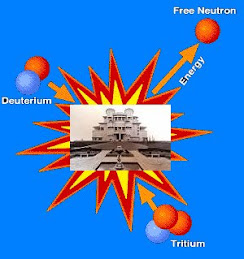Quantum mechanics, also known as quantum physics or quantum theory, is a branch of physics providing a mathematical description of much of the dual particle-like and wave-like behavior and interactions of energy and matter. It departs from classical mechanics primarily at the atomic and subatomic scales, the so-called quantum realm. In advanced topics of quantum mechanics, some of these behaviors are macroscopic and only emerge at very low or very high energies or temperatures. The name, coined by Max Planck, derives from the observation that some physical quantities can be changed only by discrete amounts, or quanta, as multiples of the Planck constant, rather than being capable of varying continuously or by any arbitrary amount. For example, the angular momentum, or more generally the action, of an electron bound into an atom or molecule is quantized. While an unbound electron does not exhibit quantized energy levels, an electron bound in an atomic orbital has quantized values of angular momentum. In the context of quantum mechanics, the wave–particle duality of energy and matter and the uncertainty principle provide a unified view of the behavior of photons, electrons and other atomic-scale objects.
Lecture 1 of Leonard Susskind's Modern Physics course concentrating on Quantum Mechanics. Recorded January 14, 2008 at Stanford University.
This Stanford Continuing Studies course is the second of a six-quarter sequence of classes exploring the essential theoretical foundations of modern physics. The topics covered in this course focus on quantum mechanics. Leonard Susskind is the Felix Bloch Professor of Physics at Stanford University.
Complete playlist for the course:
http://youtube.com/view_play_list?p=189C0DCE90CB6D81
Stanford Continuing Studies: http://continuingstudies.stanford.edu/
About Leonard Susskind: http://www.stanford.edu/dept/physics/people/faculty/sussk...
Stanford University channel on YouTube:
http://www.youtube.com/stanford





Tidak ada komentar:
Posting Komentar